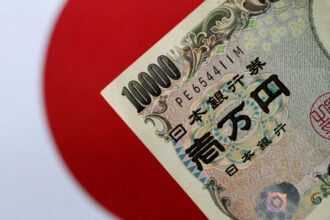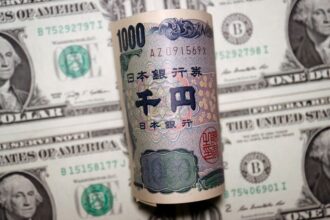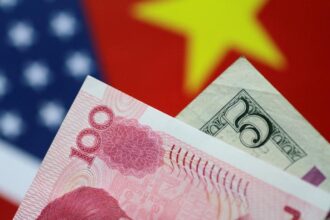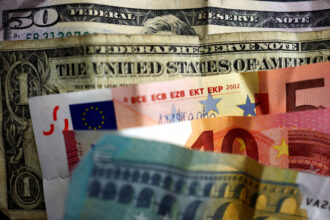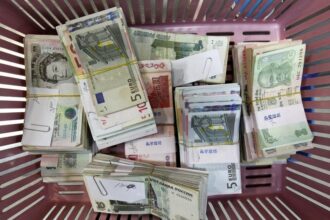By Karen Brettell
NEW YORK (Reuters) -The dollar rose on Thursday in choppy trading and was on track for its second consecutive monthly gain against the euro and yen, overcoming an earlier dip after data showed that U.S. inflation was as expected in January.
The yen gained after a policymaker hinted at the need to exit ultra-easy policies, while bitcoin held near a more than two-year high reached on Wednesday.
The dollar fell earlier on Thursday after data showed that U.S. price gains in January were the smallest in nearly three years, keeping a June interest rate cut from the Federal Reserve on the table.
“The worst fears of market participants have been largely alleviated by this print,” said Karl Schamotta, chief market strategist at Corpay in Toronto. “The big issue here was that the CPI print did kind of put the fear of God into a lot of traders – there was a lot of concern that underlying pressures could turn out to be hotter than anticipated.”
The had hit a three-month high after the Consumer Price Index (CPI) released on Feb. 13 showed prices accelerated more than expected in January.
Thursday’s dollar drop was short-lived, however, and the greenback soon bounced back.
Shaun Osborne, chief foreign exchange strategist at Scotiabank in Toronto, noted that there is “very little conviction behind some of the trading that we’re seeing in FX at the moment,” and that “the dollar looks pretty fully priced for the fundamental situation that we have right now.”
Some of Thursday’s moves were also likely due to month-end portfolio rebalancing.
Traders are closely watching economic data for clues on when the Fed is likely to begin cutting rates.
Many analysts anticipate the U.S. economy will slow in the coming months while inflation is likely to continue to ease closer to the U.S. central bank’s 2% annual target. That would prompt the Fed to begin easing and send the dollar lower.
“The signs are auguring towards a cooling in a lot of U.S. economic data and that could damage that U.S. exceptionalism trade and lead to flows out of the dollar,” said Schamotta.
Traders are pricing in a 64% probability the Fed will begin cutting rates in June, up from 63% on Wednesday, according to the CME Group’s (NASDAQ:) FedWatch Tool.
Thursday’s data shows that the path for inflation to return to 2% will be uneven, Atlanta Fed President Raphael Bostic said on Thursday.
Chicago Fed President Austan Goolsbee said he believes last year’s improvements in the supply of goods and labor set the stage for further declines in U.S. inflation this year.
The dollar index was last up 0.22% on the day at 104.15. It is set for a monthly gain of 0.57%.
The euro fell 0.33% to $1.0800 and is set for a monthly loss of 0.15%.
European data earlier on Thursday showed that price pressures in the region slowed, though there were some pockets of underlying strength.
Cheaper energy prices pushed German inflation down to 2.7% in February. Inflation also slowed in France although it was slightly higher than expected, and slowed more sharply in Spain.
National inflation data for February is being published by individual euro zone countries before the EU-wide release, slated for Friday, which is expected to show headline inflation slowing to 2.5% year-on-year in February from 2.8% in January.
The yen bounced after Bank of Japan board member Hajime Takata said he felt there were finally prospects for achieving the bank’s 2% inflation target, paving the way to leave behind negative rates and yield caps.
“Takata’s remarks should add to conviction that an earlier than expected hike at the March meeting should not be ruled out,” said Christopher Wong, currency strategist at OCBC.
The yen on Wednesday had neared the 150.88 level reached on Feb. 13, which was the weakest since Nov. 16. The greenback was last down 0.48% against the Japanese currency at 149.96 yen. The dollar is headed for a 2.07% monthly gain against the yen.
The yen has remained a popular funding currency in carry trades, in which traders sell or borrow the Japanese currency and invest in higher yielding currencies.
In cryptocurrencies bitcoin was last up 1.7% on the day at $61,853, holding just below a more than two-year high of $63,933 reached on Wednesday. It is on track for a 45% monthly increase.
Read the full article here





